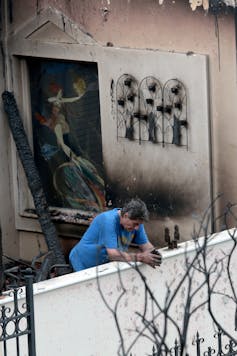The fires tore through Mati, effectively sweeping it from the map. Pantelis Saitas/EPA-EFE
Author: Ioannis Glinavos, University of Westminster
After wildfires struck coastal resorts and suburbs around Athens, the images of the destruction show the trail of devastation and death left behind. The world is understandably shocked. But fires – albeit smaller ones and with fewer deaths than on this occasion – are quite regular and seen as an unpleasant yet predictable summer occurrence in Greece.
These fires have generally been treated with resignation, and ultimately one has now led to a huge disaster. The following offers a glimpse into a very Greek tragedy.
Greece, despite being a European Union member state and a developed economy, exhibits many of the institutional deficiencies and cultural traits found in less developed nations. A large, centrally-controlled state can be a source of secure employment (as in Greece), yet is often grossly inefficient.
State power, wrongly exercised, can inhibit legitimate business, and its regulatory functions have little effect in societies where illegality and a shadow economy are prevalent. Look at post-communist countries that suffer from a legacy of a large yet weak state. Greece may never have been part of the Soviet bloc, but successive weak governments, coping badly with the country’s underdevelopment, have created a series of distortions that are unseen in Western Europe, but common in the East.
Read more:
Wildfires are raging in the Mediterranean. What can we learn?
Does Greece’s problematic historical development contribute to this particular type of disaster? The short answer is yes, it does. The explanation for how areas of Greece burst into flame each year is not simply a question of poor ecological management, building standards, fire prevention and fire-fighting capabilities. This explanation rests with the law and its enforcement.
Burn, then build?
In Greece, there is a lot of unused land classed as agricultural or forest. Greece has a complex, antiquated and incomplete legal land title system, where efforts to create a land registry (or cadastre) have been ongoing since the early 2000s and are still not even close to completion. Add in the pervasive corruption of land registry offices, forestry commissions and relevant state administration, and what you get is an opportunity for real estate development.

Pantelis Saitas/EPA-EFE
In Western Europe, it is generally not possible to build without first obtaining appropriate permits. Those who try to do so without permission are frequently discovered, stopped, fined, and even forced to alter or demolish what they’ve built. The severe legal and financial implications of building illegally makes this only a very limited problem.
In Greece, however, you could clear up a bit of brushland or cut down a section of forest, put down the foundation for a building, connect utilities by bribing local officials, and then wait for the amnesty for illegal buildings that tends to come around periodically, usually close to a general election. The latest legalization effort has been lauded as a revenue raising exercise, regardless of consequences in other areas such as – coincidentally – ecological management and fire security. And so enterprising sorts take advantage of fire to the forest, removing the barrier so that they can build homes, without care for regulations, in inaccessible areas, on land they often do not own. The forest burns, people die, developers build, and votes are won.
On what grounds could the political class justify turning a blind eye to such illegality? The usual excuses are that illegal builds are family homes constructed by the poor living on the city fringes – the unavoidable consequence of antiquated zoning laws, and so the fault of the state (of previous governments, naturally). An amnesty, the argument goes, legalizes existing situations that the state has tolerated for years, that it would be inequitable not to recognize. Never mind that many of these builds aren’t favelas, but villas with pools.
We do not know, yet, whether this new fire is the result of arson or accidental. But we do know that it fits a pattern, one that needs to be recognized and broken. In 2007, fires hit the Peloponnese, for example, claimed a high death toll, and led to a manhunt for alleged arsonists.
Whatever the spark, the source of Greece’s terrible tragedy, and many others like it, isn’t an act of God. It is a result of a dishonest political class shopping for votes, of builders making a living, of hands getting greased. It is institutionalized tragedy, one that binds a predatory state to an accomplice population.
![]() This is not to belittle the tragedy of lost lives or blame the victims for their deaths. But if Greeks are looking for someone to blame they shouldn’t look to incomplete fire prevention measures, faulty equipment, sluggish responses, or even (as is commonly claimed by the media and the government) wreckers or foreign spies. They should look in the mirror. The Greek state has tolerated, condoned and rewarded the illegality that makes these disasters recurring. Greek society has watched with disinterest. It is time this stopped.
This is not to belittle the tragedy of lost lives or blame the victims for their deaths. But if Greeks are looking for someone to blame they shouldn’t look to incomplete fire prevention measures, faulty equipment, sluggish responses, or even (as is commonly claimed by the media and the government) wreckers or foreign spies. They should look in the mirror. The Greek state has tolerated, condoned and rewarded the illegality that makes these disasters recurring. Greek society has watched with disinterest. It is time this stopped.
Ioannis Glinavos, Senior Lecturer in Law, University of Westminster
This article was originally published on The Conversation. Read the original article.




26 Comments
Pingback: relaxing sleep music
Pingback: ทดลองเล่นสล็อต pp
Pingback: nagaway สล็อต
Pingback: Tourism in Singapore
Pingback: Related Site
Pingback: situs togel terpercaya
Pingback: ความน่าสนใจของ เว็บตรงจากต่างประเทศ Avawin
Pingback: fuck boy 2024
Pingback: ราคาเอเชียนแฮนดิแคป คืออะไร
Pingback: ufa191
Pingback: Kubet ดีหรือไม่ และนี้คือเหตุผลที่คุณควรเลือกใช้บริการ
Pingback: thaisbobet168 เว็บแทงบอล ปิดแล้ว ย้ายมาเล่น lsm99 ดีกว่า
Pingback: แผ่นปูทางเท้า
Pingback: webcam chat
Pingback: cinemarule
Pingback: altogel
Pingback: หวยดังงวดนี้
Pingback: สีพ่นรถยนต์
Pingback: โคมไฟ
Pingback: โอลี่แฟน
Pingback: สมัครสล็อตวอเลท ฝากถอนไม่มีขั้นต่ำ เริ่มต้นบาทเดียว
Pingback: read more
Pingback: ufa777
Pingback: 1792 Small Batch Kentucky Straight Bourbon
Pingback: this website
Pingback: เครื่องเป่าแอลกอฮอล์